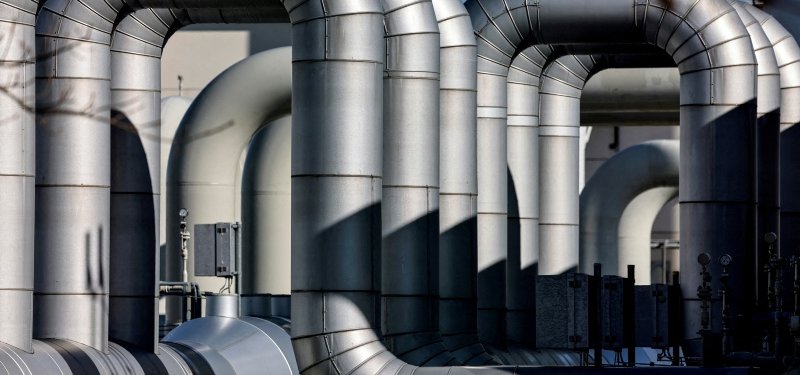
Report: Germany preparing to declare alarm on gas supply fears within 5-10 days
The alarm step, the second stage of the government's planning, could make natural gas significantly more expensive for all consumers, effective immediately. The newspaper reported that suppliers should expect the alert to be declared within five to 10 days.
- Economy
- DPA
- Published Date: 10:40 | 21 June 2022
- Modified Date: 10:40 | 21 June 2022
The German government is preparing to declare an alarm, the next step of its national gas emergency plan, in the coming days, according to a report, as fears grow that a shortage could be imminent.
Germany is rushing to reduce its dependence on Russian energy as Moscow scales back gas supplies to Western nations in what is seen as retaliation for sanctions imposed due to the war.
Experts say that it is only a matter of time before Germany is completely cut off from Russian energy, either through policy decisions or due to Russian President Vladimir Putin.
German Secretary of State for Economic Affairs Patrick Graichen briefed the energy industry about the step on Monday, Die Welt newspaper reported, citing industry circles. Sources in the energy industry confirmed this to dpa on Tuesday evening.
The alarm step, the second stage of the government's planning, could make natural gas significantly more expensive for all consumers, effective immediately.
The newspaper reported that suppliers should expect the alert to be declared within five to 10 days.
The Economics Ministry refused to comment on when the next stage in the gas emergency plan might be announced.
"The legal regulations and specifications apply to the stages of the gas emergency plan. We decide according to these guidelines and do not speculate on them. Decisions are made in each case according to the current situation," a spokesperson said.
She said that supply security was still guaranteed but that the situation was serious.
The moves come after Russia significantly reduced gas supplies through the Nord Stream Baltic Sea pipeline.
Earlier, Economics Minister Robert Habeck announced a set of measures to reduce gas consumption in industry.
Graichen made the announcement to the 55 members of the board of the Federal Association of Energy and Water Industries (BDEW). However when approached, the BDEW association said board meetings are not usually open to the public and so it would not share information or comment on what was said during meetings.
Germany's Emergency Gas Plan regulates proceedings if supply significantly deteriorates, or looks set to do so. It consists of three steps, with the first, an early warning, announced in late March.
The second stage would be the alarm stage, which comes if gas supply is disrupted or there is exceptionally high demand for gas leading to a "significant deterioration in the gas supply situation." However, under this stage, the market is still seen as able to cope with the disruption or demand spike without further intervention.
After the alarm level, comes the emergency level, with state intervention required in order to ensure supplies to "protected customers" such as private households for example.
Earlier, German Chancellor Olaf Scholz was dismissive of suggestions that Germany's three remaining nuclear power plants should remain in operation longer than planned to compensate for Russia's decision to cut gas sent via the Nord Stream 1 pipeline.
"So far there are no statements from experts on how the lifetime of the nuclear power plants could be extended," Scholz said, adding that Germany should double down of efforts to speed up the expansion of renewable energies.
So far, policy responses to fears about supply shortages have included courting other nations for supplies of liquefied natural gas (LNG) and urging the public to reduce their domestic energy consumption.
The three nuclear power plants are due to be shut down by the end of 2022 as part of Germany's energy transformation, widely known as the "Energiewende," to a nuclear free and low-carbon economy.
Friedrich Merz, the head of the conservative Christian Democrats (CDU), has been vocal in his criticism of Scholz's response to the war in Ukraine and subsequent efforts to wean the country off Russian energy imports.
Allowing the nuclear power plants to operate beyond the end of the year would be technically doable and legally justifiable in light of current events, Merz said earlier on Tuesday.
Economy Minister Robert Habeck and Environment Minister Steffi Lemke advised against longer running times for nuclear power plants, saying in a joint statement that such a move carried "major economic, legal and safety risks."

